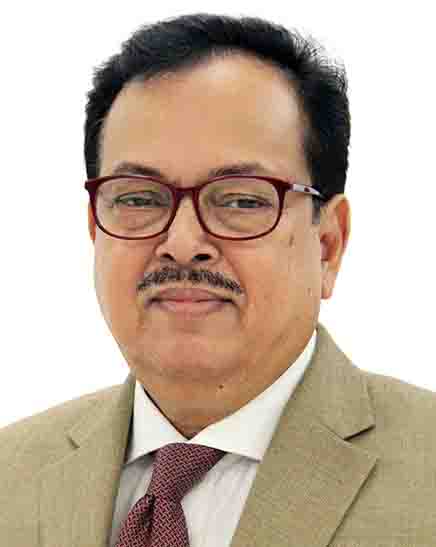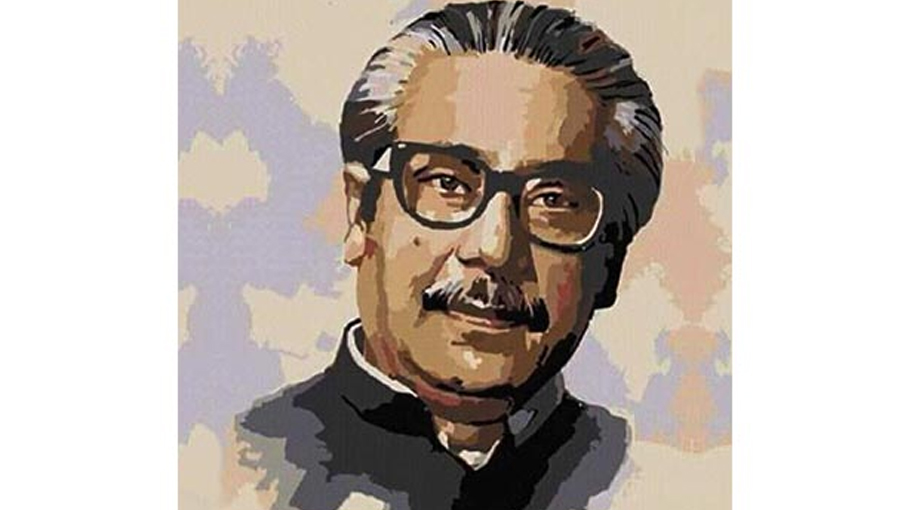Bangabandhu, the apostle of democracy

The people of Indian subcontinent (Bangladesh, India and Pakistan), were predominantly secular. There is a unique example of peaceful co-existence among people of different caste, creed, race, religion and ethnicity in this land.
Driven out by Kamal Ataturk from Turkey, the Khelafat movement had tried to sow the seeds of religion- based politics in the Indian Subcontinent and the Islamic violence penetrated into the Muslim community. With the torrent of the nationalist movement by the freedom- loving people, the British rule in India was shaking and at the same time the Khelafat movement was quelled. With the struggle for freedom intensifying when the British was looking for the escape route and the nationalist movement had unified the whole nation, the British rule in India was on the verge of collapse. Just at that moment a “two- nation theory” which was believed to be the replica of the British “divide and rule policy” was put forward by Mohammad Ali Jinnah of Muslim League. A great nationalist movement, through which the “united states of India” could have been made possible, was not completed. Because of the two- nation theory power remained in the hands of the British imperial forces and they had divided the Indian Subcontinent (The Bharat Mata). Eventually two separate states -India and Pakistan- were created in August 1947.
India, led by Jawaher Lal Nehru, started practising democracy maintaining the ideals of secularism, and on the other hand, Pakistan, led by Mohammad Ali Jinnah, began with religion- based Islamic Republic of Pakistan. No democracy and secularism have ever been practised in Pakistan since its inception. Jinnah established British styled rule and he became the first governor general of Pakistan. The hopes and aspirations of establishing secular ideals, democracy and human rights were nipped in the bud.
The majority people in Pakistan spoke Bengali but Jinnah as the governor general declared Urdu alone shall be the state language of Pakistan during his visit to East Pakistan in 1948, but it was instantly and outright rejected by the Bengalis (the majority people of Pakistan). Thus the seeds were sown to break Pakistan by Jinnah himself. It is clearly evident that Jinnah broke India by introducing two-nation theory and he also broke Pakistan by declaring that Urdu shall be the state Language of Pakistan.
It was proved that Jinnah was physically and mentally ill. It seems that he could not correctly read the feelings of the people, and that’s why he made gross mistakes in politics. His family life was also seriously disturbed because of his stubbornness and whimsical attitude. The main objective of a political leader is to work for the betterment of the people, but the call for Direct Action by Jinnah had fomented Hindu-Muslim riot in India. How many lives and how much blood it took can’t be counted and measured. The poison of Two Nation Theory and the Direct Action is still taking a heavy toll on the lives of people both in Bangladesh and India.
Whenever the demand for democracy and rule of law was raised by the people, the Pakistani rulers destroyed it with iron hand. The language of the ruling Muslim League created by Jinnah was “Ser Kuchal Denge”which means heads will be crushed into pieces. The real meaning was that “nobody will raise any question or any demand”. Liakat Ali Khan, known as the right hand man of Jinnah, took over power after the death of Jinnah. But Liakat Ali Khan was shot dead by a political clique. After the killing of Liakat Ali Khan, General Iskander Mirza took over power.
For recurring changeovers in the ruling classes, a wide-ranging uncertainty had engulfed Pakistan. The historic Language Movement started. The Bengalis as a whole nation was united and nation-wide protest started. The government was almost paralyzed. In February 21, 1952 the Pakistani rulers got furious and the police fired on the protest rally. Quite a number of student leaders and innocent people were killed. Finding no other alternative seniormost leaders of the country, Sher-e-Bangla A K Fazlul Haq, Husain Shahid Suhrawardy and Moulana Bhasani sat together sinking their differences and then most popular and powerful Awami League leader Sheikh Mujibur Rahman played a catalyst role in uniting these leaders.
The United front, a most sought- after political front was formed and they insisted on demanding election. Those leaders were so powerful and respected across the country that the ruling class could not avoid them. A general election was held in 1954 and the united front won the landslide victory and the power-hungry Muslim League leaders always busy minting money, were politically vanquished. The United front formed cabinet with Sher-e-Bangla A K Fazlul Haq as prime minister and the Awami League being the majority party of the united front Sheikh Mujib was made a minister with quite a number of important portfolios.
The ruling class couldn’t think of such an overwhelming results of the election. It was even beyond their thinking that the United Front would emerge as the real political front of the people. The ruling clique didn’t allow united front to rule. People’s rights and their aspirations were being trampled under the military boots. The first ever election in Pakistan aimed at an attempt to facilitating democracy was crying in the wilderness. Some face- saving plays were staged and finally military rule was imposed by Ayub Khan in 1958.
The reign of terror was let loose by Ayub Khan. Before taking over power, Ayub Khan arrested Awami League leader Sheikh Mujib. Nationwide oppression and suppression had made the life of the people miserable and the misrule lasted almost ten years. The people had lost their freedom of speech. Almost all the political parties continued to protest the military rule of Ayub Khan. At one stage Maulana Abdul Hamid Khan Bhasani said, “Don’t disturb Ayub”. Why and how could he say this is still a mystery. Some extremist political leader and organizations might have played a role in misleading the Maulana.
Meanwhile Awami League leader Sheikh Mujib announced his six- point demand, and with that announcement Ayub Khan became crazy. Sheikh Mujib and his other associates were sent to jail and the treason charge (called Agartola Conspiracy Case) was framed against them. A nationwide movement started against the military rule of Ayub Khan. As a result of a mass upsurge in 1969 Sheikh Mujib came out of jail to be greeted with the hero’s welcome by the mass people and the people gave him the title of Bangabandhu. And general Ayub Khan was bound to step down and handed over power to army chief general Yahya Khan.
The military ruler Yahya Khan was also compelled to announce general election scheduled to be held on 7 December 1970. The elections were held on schedule and the Awami League under the leadership of Sheikh Mujib won landslide victory which was beyond the imagination of the Pakistani military rulers.
Bangabandhu Sheikh Mujib was supposed to be invited by the president to take oath of office as prime Minister of Pakistan followed by the parliament session. But it didn’t happen due to some leaders and military junta. Z A Bhutto, chief of Pakistan People’s Party (PPP), in connivance with military ruler general Yahya Khan had started drama in the name of dialogue. Bhutto’s PPP got second largest number of seats in parliament election and he was supposed to sit in the opposition bench. But he started farcical and absurd talks which were colliding with the democratic norms. Once Bhutto proposed that “there should be two Prime Ministers, one for East Pakistan and another for West Pakistan. Again he said that “ there are three political forces in Pakistan, one is Awami League another is his PPP and the third one is Pakistan Military.” PPP and Pakistan Military had an alliance. According to Bhutto, PPP and Army united is a majority, so he should be made prime minister of Pakistan. Such ravings of Bhutto made the Pakistan army mad. Neither they had shown respect to democratic verdict given by the common people through election, nor did they care for world opinion. And under the cover of dialogue they were taking time and mobilizing forces from West Pakistan for crackdown upon the people of East Pakistan. Long cherished democracy had again fallen into a quagmire.
Being an elected leader of the country, Bangabandhu Sheikh Mujib couldn’t allow Pakistani Military to snatch away the rights of the people. Sheikh Mujib gave a clarion call to the (Bengalis) people of then East Pakistan to fight the Pakistan Army with whatever they had and continue war till the last drop of blood. Bangabandhu’s call had been working for the freedom fighters as the main source of inspiration. Only in the nine months of war Pakistan Army suffered a humiliating defeat and was compelled to surrender on 16th December 1971 and a new sovereign and independent nation Bangladesh came into being.
The people of Bangladesh were not happy with the country’s independence alone. To them the Bangabandhu and Bangladesh is one and inseparable. Sheikh Mujib returned to Bangladesh from the Pakistani captivity on January 10, 1972. The government in exile, which fought against Pakistani Military rulers and achieved historic victory on 16th December, 1971, handed over power to Bangabandhu on 12 January, 1972. Bangabandhu Sheikh Mujib became the prime Minister of newly born Bangladesh. The War of Liberation came to an end, but there were huge arms in possession of so many young groups. Country’s fabrics of law and order was getting bad to worse and even then the democracy was being practised by the then government of Prime Minister Bangabandhu Sheikh Mujibur Rahman.
Sharif Shahab Uddin is Editor-in-Chief, Bangladesh Post.



